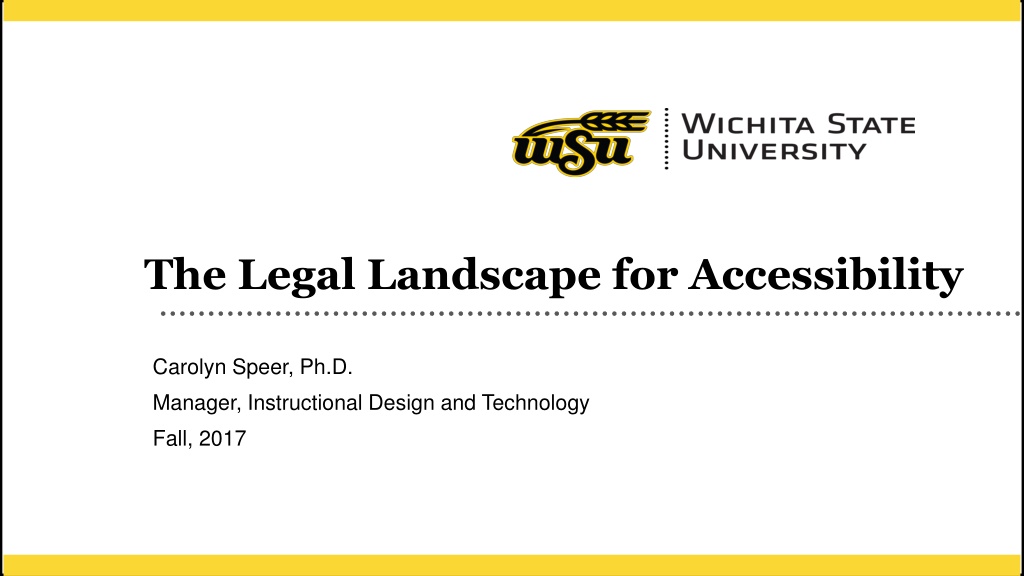
Legal Landscape for Accessibility in Education
This presentation explores the legal landscape for accessibility in education, focusing on federal laws such as Section 504, Title II of the ADA, and Section 508. It discusses the role of the Office of Civil Rights in ensuring accessibility, the importance of accessible technology in educational settings, examples of technology complaints related to accessibility, recurring themes emphasizing the need for accessibility in websites, online content, documents, and videos, and the distinction between accessibility and accommodations.
Download Presentation

Please find below an Image/Link to download the presentation.
The content on the website is provided AS IS for your information and personal use only. It may not be sold, licensed, or shared on other websites without obtaining consent from the author. If you encounter any issues during the download, it is possible that the publisher has removed the file from their server.
You are allowed to download the files provided on this website for personal or commercial use, subject to the condition that they are used lawfully. All files are the property of their respective owners.
The content on the website is provided AS IS for your information and personal use only. It may not be sold, licensed, or shared on other websites without obtaining consent from the author.
E N D
Presentation Transcript
The Legal Landscape for Accessibility Carolyn Speer, Ph.D. Manager, Instructional Design and Technology Fall, 2017 1
Agenda Office of Civil Rights 504, 508, ADA Atlantic Cape CC WSU s Agreement 2 2
Who is the Office of Civil Rights? Housed within the Department of Education Enforces federal civil rights laws Has some ADA Title II responsibilities 3
The OCR and Technology Has a particular concern about technology used in the educational setting: It is unacceptable for universities to use emerging technology without insisting that this technology be accessible to all students. Technology is the hallmark of the future, and technological competency is essential to preparing all students for future success. Emerging technologies are an educational resource that enhances learning for everyone, and perhaps especially for students with disabilities. 4
Examples of Technology Complaints SC State Technical College System (2013) Website Louisiana Technical University (2013) MyOMLab University of Montana, Missoula (2014) LMS and course materials Youngstown State University (2014) Website University of Cincinnati (2014) Website, online classes, videos, video player Marcie Lipsitt, 500 complaints and counting 5
Recurring themes Websites must be accessible Online content must be accessible Online documents must be accessible Online videos must be captioned Assistive technology must be widely available This is everyone s responsibility, not for a select few There must be some kind of campus coordinator 6 www.htctu.net 6
What are Section 504 and Title II of the ADA? Section 504 is federal law that applies to receivers of federal assistance Title II of the ADA is federal law that is broadly applied Generally the same Section 508 is federal law that applies to the federal government 7
Accessibility versus Accommodations Accessibility: proactive for populations. Accommodations: reactive for individuals Accessibility Create accessible content Build accessible websites Purchase accessible technology Accommodations Adjust for individual needs 8
Withering Away of Accommodation? Access Accommodation 9 3/17/2025 9
Back to the Law The legal cases have been expanding since 2014 Atlantic Cape Community College (2015) OCR Consent Decree College did not choose to have representation Jumped forward in obligations 10
ACCCs Consent Decree Required to hire a third-party consultant Required to adopt accessibility policies Provide ADA training to all staff and students Undergo a full technology audit Remediate the website to full accessibility All course content, including face-to-face content must be accessible. Make regular reports $128,620 award for attorneys fees to the student 11
Wichita States NFB Agreement Hire an Accessibility Coordinator Adopt and disseminate policies and procedures Provide ADA training and consider other training for staff, faculty, and students Undergo a full technology audit Remediate the website to full accessibility All course content, including face-to-face content must be accessible. 12
Implications We must be prepared to work together Success is moving forward Document our process Help disseminate knowledge and training 13
